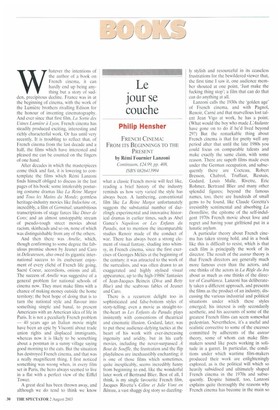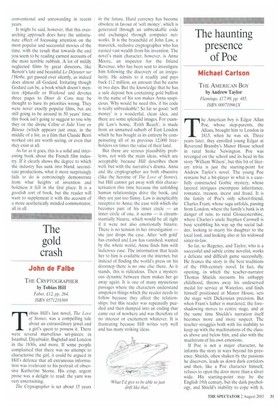Le jour se couche
Philip Hensher
FRENCH CINEMA: FROM ITS BEGINNINGS TO THE PRESENT by Remi Fournier Lanzoni Continuum, £24.99, pp. 408, ISBN 0826413994 Nvhatever the intentions of [he author of a book on French cinema, it can hardly end up being anything but a story of sudden, precipitous decline. France was in at the beginning of cinema, with the work of the Lumiere brothers rivalling Edison for the honour of inventing cinematography. And ever since that first film, La Sonic des Mines Lumiere a Lyon, French cinema has steadily produced exciting, interesting and richly characterful work. Or has until very recently. It is troubling to reflect that. of French cinema from the last decade and a half, the films which have interested and pleased me can be counted on the fingers of one hand.
After decades in which the masterpieces come thick and fast, it is lowering to contemplate the films which Rem' Lanzoni finds himself obliged to discuss in the last pages of his book: some intolerably posturing costume dramas like La Reine Margot and Tous les Matins du Monde; gormless heritage-industry movies like lndochine or, incredibly, a film of Germinal: unambitious transcriptions of stage farces like Diner de Cons; and an almost unstoppable stream of pseudo-tough street movies about racism, skinheads and so on, none of which was distinguishable from any of the others.
And then there was Antelie, which, though confirming to some degree the fabulous promise shown by ,ieunet and Caro in Delicatessen, also owed its gigantic international success to its exuberant enjoyment of every cliche of French life going, Sacre Coeur, accordions, onions and all. The success of Amelie was suggestive of a general problem for national schools of cinema now. They must make films with a chance of making money outside the home territory: the best hope of doing that is to turn the national style and flavour into something simple and banal, to present Americans with an American idea of life in Paris. It is not a peculiarly French problem —40 years ago an Italian movie might have been an epic by Visconti about trade union rights and displaced immigrants, whereas now it is likely to be something about a postman in a sunny village saying good morning to the cats. But the situation has destroyed French cinema, and that was a really magnificent thing. I first noticed something was wrong when, in every film set in Paris, the hero always seemed to live in a flat with a perfect view of the Eiffel Tower.
A great deal has been thrown away, and although we do tend to think we know
what a classic French movie will feel like, reading a brief history of the industry reminds us how very varied the style has always been. A lumbering, conventional film like La Reine Margot unfortunately suggests the substantial number of dazzlingly experimental and innovative historical dramas in earlier times, such as Abel Gance's Napoleon or Les Enfants du Paradis, not to mention the incomparable studies Renoir made of the conduct of war. There has always been a strong element of visual fantasy, shading into whimsy, in French cinema, since the first exercises of Georges Melies at the beginning of the century; it was attracted to the work of the surrealists, and was often drawn to an exaggerated and highly stylised visual appearance, up to the high-1980s' fantasies of Jean-Jacques Beineix (Diva and Betty Blue) and the scabrous fables of Jeunet and Caro.
There is a recurrent delight too in sophisticated and false-bottom styles of story-telling; even a movie as straight-tothe-heart as Les Enfants du Paradis plays insistently with conventions of theatrical and cinematic illusion. Godard, later, was to put these audience-defying tactics at the heart of his work with ever-increasing ingenuity and aridity, but in his early movies, including the never-surpassed A Bout de Souffle, the frustration and the flip playfulness are inexhaustibly enchanting; it is one of those films which sometimes, quite inexplicably, seems incredibly funny from beginning to end, like the wonderful later work of Bertrand Blier. Best of all, I think, is my single favourite French film, Jacques Rivette's Celine et Julie Vont en Bateau, a vast shaggy dog story so dazzling ly stylish and resourceful in its ceaseless frustrations for the bewildered viewer that, the first time I saw it, one audience member shouted at one point, 'Just make the fucking thing stop'; a film that can do that can do anything at all.
Lanzoni calls the 1930s the 'golden age' of French cinema, and with Pagnol, Renoir, Came and that marvellous lost talent Jean Vigo at work, he has a point. (What would the boy who made L'Atalante have gone on to do if he'd lived beyond 29?) But the remarkable thing about French cinema is that for pretty well any period after that until the late 1980s you could focus on comparable talents and make exactly the same claim, with some reason. There are superb films made even under the German occupation, and subsequently there are Cocteau, Robert Bresson, Chabrol, Truffaut, Resnais, Godard, Louis Malle, Rivette, Eric Rohmer, Bertrand Blier and many other splendid figures; beyond the famous names, too, there are hundreds of small gems to be found, like Claude Goretta's irresistibly sentimental and absorbing La Dentelliere, the epitome of the self-indulgent 1970s French movie about love and regret and having your girlfriend put in a lunatic asylum.
A particular theory about French cinema has taken strong hold, and in a book like this is difficult to resist, which is that each film is principally the work of its director. The result of the auteur theory is that French directors are generally much more famous even than the actors, and one thinks of the actors in La Regle du Jeu about as much as one thinks of the director of Casablanca. Lanzoni has deliberately taken a different approach, and presents the films as the product of an industry, discussing the various industrial and political situations under which these styles emerged; his interest is only secondarily aesthetic, and his accounts of some of the greatest French films can seem somewhat pedestrian. Nevertheless, it's a useful and realistic corrective to some of the excesses committed by adherents of the auteur theory, some of whom can make filmmakers sound like poets working in solitude in a garret. In particular, the conditions under which wartime film-makers produced their work are enlighteningly explored, as is the political will which so heavily subsidised and ultimately shaped French cinema in the 1970s and subsequently. Despite himself, too, Lanzoni explains quite thoroughly the reasons why French cinema has become in the main so conventional and unrewarding in recent years.
It might be said, however, that this overarching approach does have the unfortunate effect of focussing attention on the most popular and successful movies of the time, with the result that towards the end you seem to be reading earnest accounts of the most terrible rubbish. A lot of mildly neglected films by great directors, like Renoir's late and beautiful Le Dejeuner sur l'Herbe, get passed over silently, as indeed does almost all Godard. Irritating though Godard can be, a book which doesn't mention Alphaville or Weekend and devotes three pages to Diner de Cons may be thought to have its priorities wrong. They were never exactly popular films, but are still going to be around in 50 years' time; this book isn't going to suggest to you why they or the divine Celine et Julie Vont en Bateau (which appears just once, in the middle of a list, as a film that Claude Berri worked on) are worth seeing, or even that they exist at all.
As far as it goes, this is a solid and interesting book about the French film industry. If it clearly shows the degree to which the industry has sunk into bland, secondrate productions, what it more surprisingly fails to do is convincingly demonstrate from what heights of invention and boldness it fell in the first place. It is a goodish sort of book, but the reader will want to supplement it with the account of a more aesthetically minded commentator, all in all.



























































 Previous page
Previous page